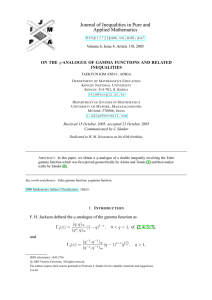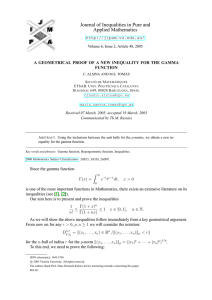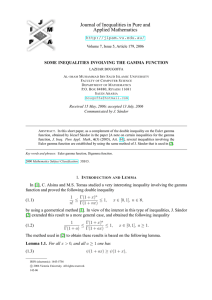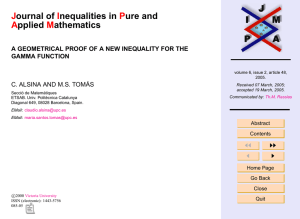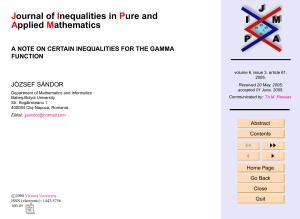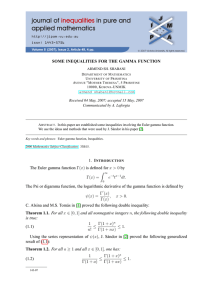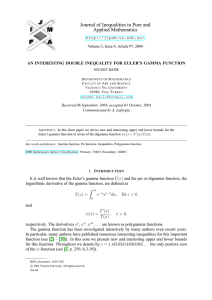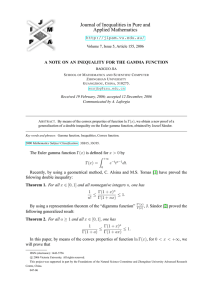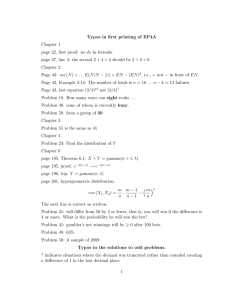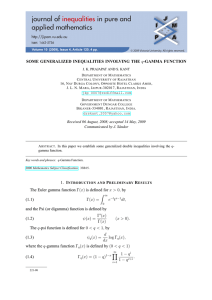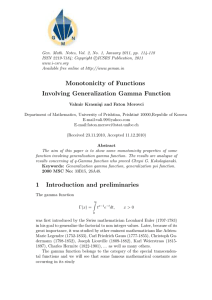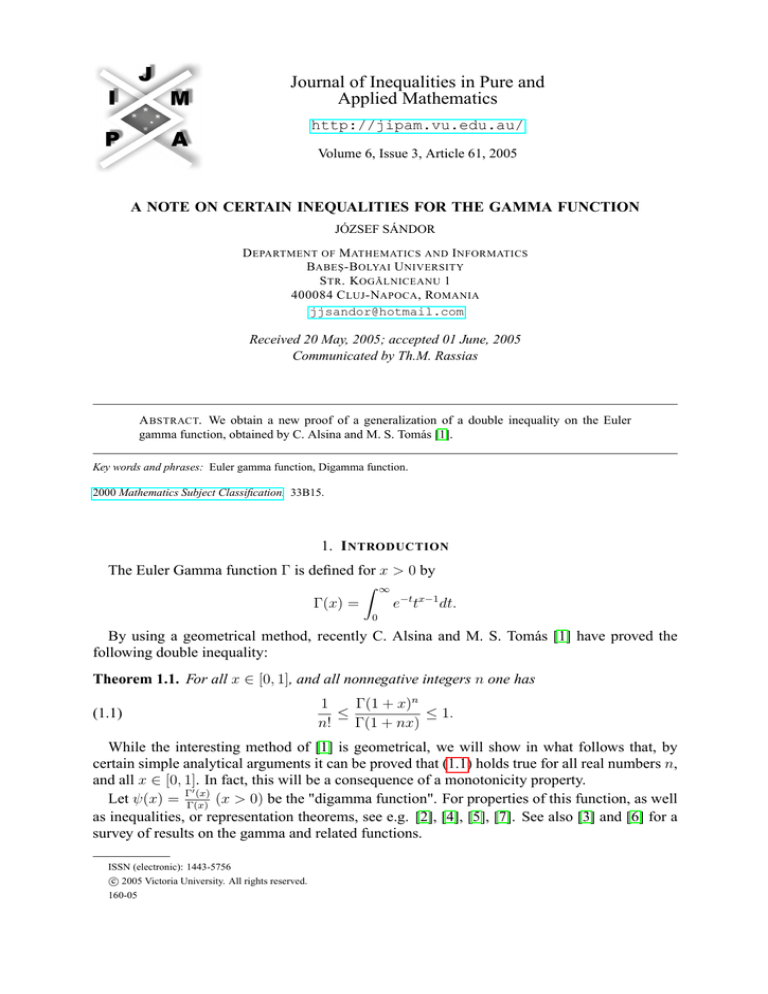
Journal of Inequalities in Pure and
Applied Mathematics
http://jipam.vu.edu.au/
Volume 6, Issue 3, Article 61, 2005
A NOTE ON CERTAIN INEQUALITIES FOR THE GAMMA FUNCTION
JÓZSEF SÁNDOR
D EPARTMENT OF M ATHEMATICS AND I NFORMATICS
BABE Ş -B OLYAI U NIVERSITY
S TR . KOG ĂLNICEANU 1
400084 C LUJ -NAPOCA , ROMANIA
jjsandor@hotmail.com
Received 20 May, 2005; accepted 01 June, 2005
Communicated by Th.M. Rassias
A BSTRACT. We obtain a new proof of a generalization of a double inequality on the Euler
gamma function, obtained by C. Alsina and M. S. Tomás [1].
Key words and phrases: Euler gamma function, Digamma function.
2000 Mathematics Subject Classification. 33B15.
1. I NTRODUCTION
The Euler Gamma function Γ is defined for x > 0 by
Z ∞
Γ(x) =
e−t tx−1 dt.
0
By using a geometrical method, recently C. Alsina and M. S. Tomás [1] have proved the
following double inequality:
Theorem 1.1. For all x ∈ [0, 1], and all nonnegative integers n one has
(1.1)
1
Γ(1 + x)n
≤
≤ 1.
n!
Γ(1 + nx)
While the interesting method of [1] is geometrical, we will show in what follows that, by
certain simple analytical arguments it can be proved that (1.1) holds true for all real numbers n,
and all x ∈ [0, 1]. In fact, this will be a consequence of a monotonicity property.
0 (x)
Let ψ(x) = ΓΓ(x)
(x > 0) be the "digamma function". For properties of this function, as well
as inequalities, or representation theorems, see e.g. [2], [4], [5], [7]. See also [3] and [6] for a
survey of results on the gamma and related functions.
ISSN (electronic): 1443-5756
c 2005 Victoria University. All rights reserved.
160-05
2
J ÓZSEF S ÁNDOR
2. M AIN R ESULTS
Our method is based on the following auxiliary result:
Lemma 2.1. For all x > 0 one has the series representation
ψ(x) = −γ + (x − 1)
(2.1)
∞
X
k=0
1
.
(k + 1)(x + k)
This is well-known. For proofs, see e.g. [4], [7].
Lemma 2.2. For all x > 0, and all a ≥ 1 one has
ψ(1 + ax) ≥ ψ(1 + x).
(2.2)
Proof. By (2.1) we can write ψ(1 + ax) ≥ ψ(1 + x) iff
−γ + ax
∞
X
k=0
∞
X
1
1
≥ −γ + x
.
(k + 1)(1 + ax + k)
(k
+
1)(1
+
x
+
k)
k=0
Now, remark that
a
1
a−1
−
=
≥0
(k + 1)(1 + ax + k) (k + 1)(1 + x + k)
(1 + x + k)(1 + ax + k)
by a ≥ 1, x > 0, k ≥ 0. Thus inequality (2.2) is proved. There is equality only for a = 1.
We notice that (2.2) trivially holds true for x = 0 for all a.
Theorem 2.3. For all a ≥ 1, the function
f (x) =
Γ(1 + x)a
Γ(1 + ax)
is a decreasing function of x ≥ 0.
Proof. Let
g(x) = log f (x) = a log Γ(1 + x) − log Γ(1 + ax).
Since
g 0 (x) = a[ψ(1 + x) − ψ(1 + ax)],
by Lemma 2.2 we get g 0 (x) ≤ 0, so g is decreasing. This implies the required monotonicity of
f.
Corollary 2.4. For all a ≥ 1 and all x ∈ [0, 1] one has
(2.3)
1
Γ(x + 1)a
≤
≤ 1.
Γ(1 + a)
Γ(ax + 1)
Proof. For x ∈ (0, 1], by Theorem 2.3, f (1) ≤ f (x) ≤ f (0), which by Γ(1) = Γ(2) = 1
implies (2.3). For a = n ≥ 1 integer, this yields relation (1.1).
J. Inequal. Pure and Appl. Math., 6(3) Art. 61, 2005
http://jipam.vu.edu.au/
A N OTE ON C ERTAIN I NEQUALITIES FOR THE G AMMA F UNCTION
3
R EFERENCES
[1] C. ALSINA AND M.S. TOMÁS, A geometrical proof of a new inequality for the gamma function, J. Ineq. Pure Appl. Math., 6(2) (2005), Art.48. [ONLINE: http://jipam.vu.edu.au/
article.php?sid=517]
[2] E. ARTIN, The Gamma function, New York, Toronto, London, 1964.
[3] D.S. MITRINOVIĆ, Analytic Inequalities, Springer Verlag, 1970.
[4] A. NIKIFOROV
Moscou, 1976.
AND
V. OUVAROV, Éléments de la Théorie des Fonctions Spéciales, Ed. Mir,
[5] J. SÁNDOR, Sur la fonction Gamma, Publ. C. Rech. Math. Pures Neuchâtel, Série I, 21 (1989), 4–7.
[6] J. SÁNDOR AND D.S. MITRINOVIĆ (in coop. with B. CRSTICI), Handbook of Number Theory,
Kluwer Acad. Publ., 1996.
[7] E.T. WHITTAKER
1969.
AND
G.N. WATSON, A Course of Modern Mathematics, Camb. Univ. Press,
J. Inequal. Pure and Appl. Math., 6(3) Art. 61, 2005
http://jipam.vu.edu.au/

